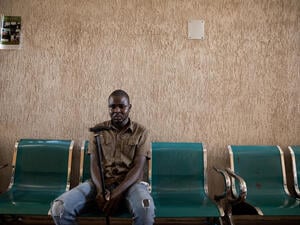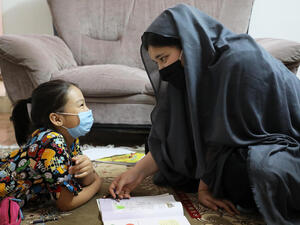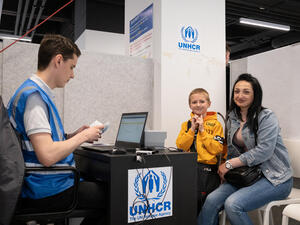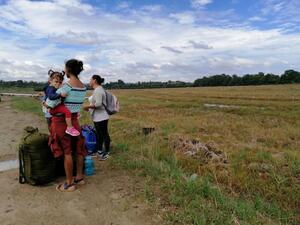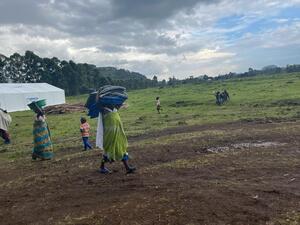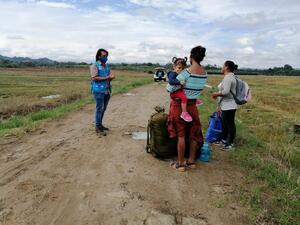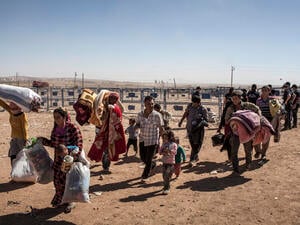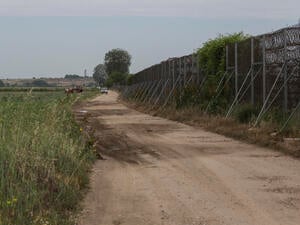Q&A: Growing caseload of asylum seekers for UNHCR offices in Israel
Q&A: Growing caseload of asylum seekers for UNHCR offices in Israel

Mickey Bavly, Honorary UNHCR Representative in Jerusalem.
GENEVA, July 13 (UNHCR) - Former Israeli diplomat Mickey Bavly has been the honorary representative for UNHCR in Jerusalem since 1999. The UN refugee agency has no role in handling the issue of Palestinian refugees, but it has a growing caseload dealing with asylum seekers from Africa - particularly Sudanese. Bavly recently discussed this work and Israel's approach to refugees during a meeting with Senior Public Information Officer Astrid van Genderen Stort. Excerpts from the interview:
Tell us a bit about the UNHCR presence in Israel
UNHCR has been operating in Israel for about 25 years. During the first 17 years, the work mainly consisted of receiving requests from asylum seekers, preparing their files and sending them to Geneva for a final decision - with the Israeli government most of the time accepting Geneva's decisions. In 17 years some 60-70 cases - mostly Ethiopians - benefited from this.... It was a long procedure and not an easy one.
I came as an honorary correspondent and started to build up the office in Jerusalem. The office grew as the number of asylum seekers increased. The next step was passing the decision-making to the Israeli government. The government of Israel asked UNHCR to continue to do the first stage of the assessments, interviews and to present recommendations.... We interview asylum seekers and make a recommendation to the government, to a special body headed by an independent jurist and composed of the ministries of interior, foreign affairs and justice. The committee then makes the recommendation based on our file.
Today, we have an honorary representative in Jerusalem and our main office was opened on February 1 in Tel Aviv headed by a senior liaison officer.
How big is your caseload?
As time has passed, the number of asylum requests has increased. We have received some 6,000 requests from asylum seekers. Many of them came from countries that were at war, or in crisis. We persuaded the government of Israel to allow citizens of countries such as Sierra Leone, Liberia, Democratic Republic of the Congo, Ivory Coast and Togo to stay in Israel until the war in their homes is over. The next step was to obtain the right for them to work, to become legal and not to be arrested or deported. This now works very well.
Each year, we also have asylum seekers who come to Israel not because of a crisis in their country, but because they are personally persecuted.
We have in total some 1,300-1,400 ... people who are awaiting interviews. Out of this total, we are most concerned about 200 Eritreans in prison, many of whom were attracted by work possibilities.
Some asylum seekers have gone back to their countries. Those who have been staying illegally and have not received the right to stay are deported ... unless they are from countries defined as enemy states under Israeli law.... because their country of origin might view the fact that they went to Israel unfavourably and they could be in danger if they return.
We have special arrangements for them. With the help of Geneva, we have resettled many of them in the past few years. The problem became bigger and more complicated when Sudanese refugees seeking better living conditions started arriving [in the first half of last year] in the country after being brought across the Sinai Desert by smugglers. The current rate of arrivals is 200-300 a month. This puts tremendous pressure on the protection system of the country and a solution has to be found. All concerned are working on it.
Israel has acceded to the 1951 Refugee Convention, but does it have a refugee law?
No, Israel does not have a refugee law and I think psychologically the reason is that the major refugee crisis that has faced Israel since its creation is the Palestinian issue. Although the Palestinian refugees dealt with by UNRWA [United Nations Relief & Works Agency for Palestine Refugees] are not part of the Convention and although any refugee law in Israel does not have to deal with the Palestinian refugee issue, politicians do not always make the distinction and are hesitant about a national refugee law. So we took a sort of roundabout route and created regulations such as the right to work, temporary protection, non-refoulement. We assembled some bricks.... When enough bricks are accepted, the Minister of Justice will presumably come to parliament and say, "Look, there are now 25 bricks - let us turn them into a 25-article law."
Whenever we have a problem that should have been solved by a law, we try to solve it in another way and with the good cooperation of the authorities. The authorities are very conscious of the importance of treating refugees and asylum seekers in a humane way and they are appreciative of the work UNHCR is doing in the matter.
Is there a willingness to promulgate a law soon?
I think that when we solve the Sudanese crisis, which has received big media exposure and come before parliament ... the sky is the limit for possible actions. If it is not solved and the boundaries crumble and thousands of Sudanese arrive in the country, the system will collapse. The government will not tolerate it and will find ways to stop the flow. If we can stop the flow in a diplomatic way, it will be a success story in which public opinion was involved and became, in the process, much more conscious of refugee issues.
If no solution is found, might Israel bar entry to the Sudanese?
It is important to emphasize from a protection perspective that there is no risk of refoulement [forced return] from Israel even though some of the cases are very challenging for Israel to deal with under its laws and given the circumstances in the region. There is no risk, it has not happened and we do not think it will.
Did last year's Lebanon crisis affect the work of the office?
The Lebanon crisis did not affect the work of the office, nor did it influence the stream or number of asylum seekers. We had a lot more work at the start of the Second Gulf War [March 2003] when we had to see to it that all asylum seekers in the country got their gas masks.
The conflict in Lebanon [July 12-August 14, 2006] was more of an internal Israeli problem than a problem with asylum seekers. Half a million Israelis moved out of the north; we had about half-a-million internally displaced people. They did not need UNHCR to solve their problems, they had their families, there were hotels, they had whatever they needed and they returned about an hour after the cease-fire.
Why did you decide to join UNHCR after a long diplomatic career?
When I retired, I had planned to work in the field of music, classical music. Then I was asked to join UNHCR.... I wanted to do the job to make sure that Israel keeps a humane face when dealing with the refugee Convention, refugees and asylum seekers and that it behaves the way I would like my country to behave on every issue to do with human rights. If I can contribute to that ... that is my biggest pride.

